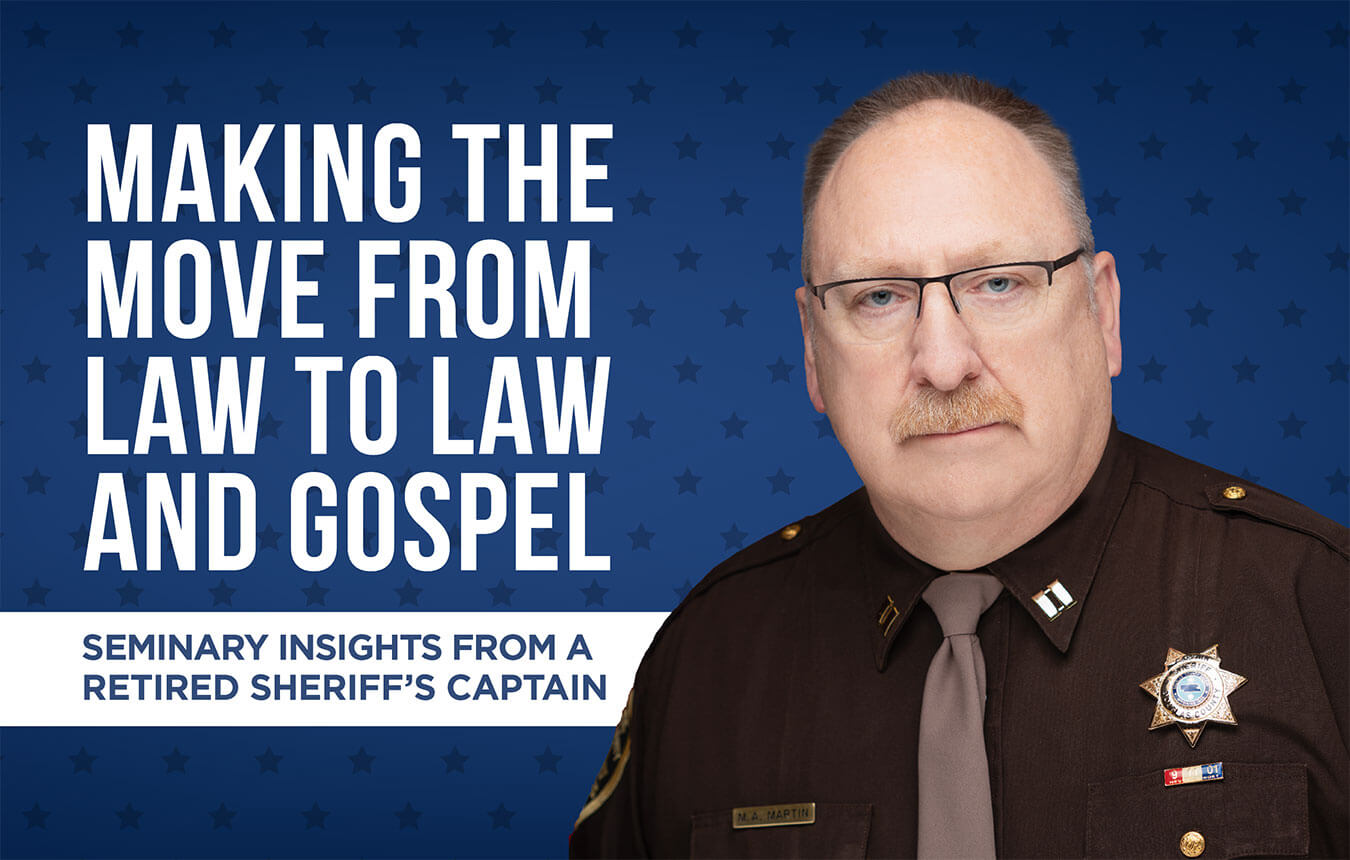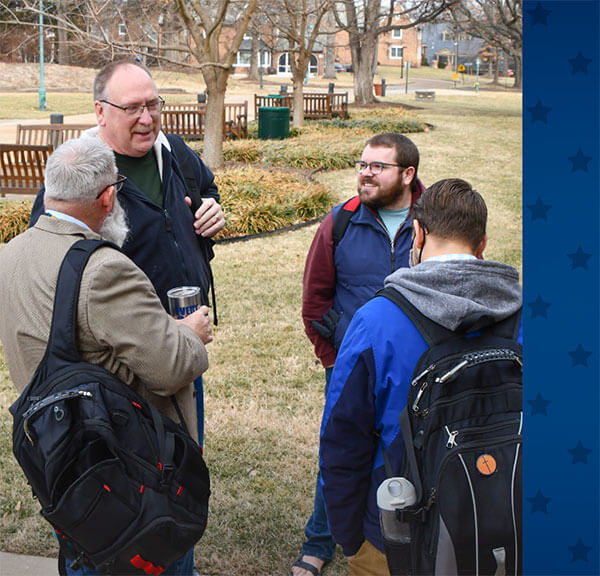
Concordia Seminary Newsroom
Making the Move from Law to Law and Gospel

by Rebekah Lukas
What does a law enforcement officer have in common with a parish pastor? More than you might think. Retired sheriff’s captain and current Concordia Seminary student Matthew Martin recently sat down with Concordia Seminary magazine and shared how God prepared him for ministry by first giving him a career of more than 30 years in law enforcement.
Martin’s journey began after he graduated from Wayne State College in Wayne, Neb., with a Bachelor of Science in criminal justice in 1989 and started his first job as a patrol officer for the Norfolk, Neb., police department. He married Tami in 1995 and they had two children, Jessica and Jacob. After five years in Norfolk, the Douglas County Sheriff’s Office in Omaha, Neb., hired him, and over the next 27 years, Martin moved from patrol officer to sergeant, to lieutenant, to captain and everything in between.
“I did court security, patrol, was a field training officer and did training for our agency and others, including the state academy. I did criminal investigations, which involved everything from portraying a 14-year-old girl on the internet to investigating homicides,” Martin said. “I worked internal affairs for 10 years, testifying in state and federal court, and spent a year and a half in the administrative services bureau.”
In 2014, Martin earned a Master of Arts in public administration from Bellevue University in Bellevue, Neb.
“I started training at the FBI National Academy at Quantico in 2017, but had a medical emergency on the track and had to go home two days in after receiving two heart stints. But I returned the next year, completing the 10-week, 17-credit course through the University of Virginia. I passed,” he recounted with a smile.
After serving the county sheriff’s office as captain for about two years, Martin retired in May 2021. And how did he kick off his retirement? He and Tami packed, sold their house and moved to St. Louis in time for Martin to begin summer Greek at the Seminary in June. He started the Residential Alternate Route (RAR) Program that fall.

“Basically, I moved from law to Law and Gospel,” Martin said smiling. “I have some different life experiences than other people, having been shot at or having a knife pulled on me. I’ve had to deliver death notifications and talk with victims of crime. I’ve worked with people experiencing pain and suffering and shared their pain. I feel those are skills that are translatable to this field, this calling of being a pastor.”
While in law enforcement, Martin could not share his faith unless he was directly asked about it. At times, though, he was given opportunities to share his hope in Jesus Christ and the resurrection, but he still had to walk the line between church and state. “As a pastor, I won’t need permission or have to worry about getting fired for sharing my faith as I might have as a law enforcement officer,” he said.
Working with people experiencing pain and suffering is not the only cross-over skill from law enforcement to pastoral ministry that Martin discovered through his Seminary studies.
“In dealing with officers for more than 30 years, we conducted written exams, interviews, background investigations, polygraphs, psychological exams and physical exams, all before we hired anyone to make sure we were hiring the best people,” Martin said. “Yet, some still failed. They’re human. So we provided tools to get them through.”
Martin recounted a mentor program he was involved with while he worked with the sheriff’s office.
“When done properly, it allowed new employees to team up with older mentors, giving them a way to ask questions they might not have felt comfortable bringing to their supervisor or chain of command,” he said. “It allowed us to ensure the younger guys were getting good counsel, training and support.”
Now, having been at the Seminary for almost two years, Martin sees the value of that experience and brings it to bear with his classmates. “A lot of the students here are young enough to be my children,” he said. “I’m able to help these younger seminarians, mentor them, guide them as needed, to reassure them they are on the right path even if they feel like they’re failing.”

Yet, Martin acknowledged, he also has a lot to learn. “Like anyone else, I’m broken,” he said. “A lot of times, broken people need another broken person to point them to Christ, to show them the One who can fix us. Here at the Seminary, our professors are first-class. I’m not just learning new things every day. I’m learning new things every hour.
The things of the faith, I’m able to see them and understand them in ways I never have before.”
Now that Martin is becoming a pastor, he is able to join his previous career and experiences with his new Seminary experiences and education and point broken people to Jesus. “While we didn’t have Confession and Absolution in law enforcement, I was still able to show those guys that we’re all broken, and here’s the path you need to follow to continue in the force,” he said. “Now, I’ll get to help people know the One who is perfect through my specific role in the pastoral office, showing them and walking with them along the path they need to follow to continue in life.”
With only a few months left of his Seminary studies in St. Louis, Martin soon will leave for his vicarage assignment, which, after a year, may be converted into his first pastoral call. “I don’t know how much time God has left for me on this earth, but I know with the time I have left, I want to tell people what Jesus has done for them,” Martin said. “I want to share the Good News of Christ’s death and resurrection for us, to help strengthen people’s faith and help them to know their Lord and Savior, Jesus.”
Deaconess Rebekah Lukas is a communications specialist at Concordia Seminary, St. Louis.